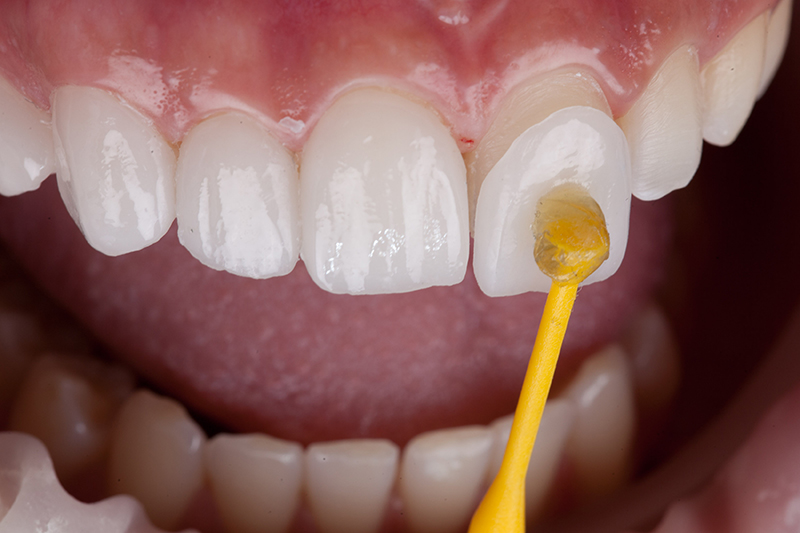In dental health and aesthetics, the terms “dentures” and “false teeth” are often used interchangeably, leading to a common misconception about their true nature. However, it is important to understand the difference between them, especially for those who are looking to restore their smile.
This article aims to clear up any confusion by shedding light on the nuanced distinctions that set dentures and false teeth apart. Whether you are considering dental restoration options or just curious about dental terminology, keep reading!
What Are False Teeth?
False teeth are produced from acrylic resin and are created to replace one or two missing teeth. You may need false teeth if a tooth or two have been removed following an infection, accident or injury that caused damage to your teeth.
Let’s go over the different types of false teeth.
Dental Implants
Dental implants are the anchor point onto which your new false teeth can be placed. Dental implants are fused with your lower or upper jawbone and are made of titanium. They serve as a new ‘root’ onto which your false teeth can be placed.
Dental Bridges
If you’ve been unfortunate enough to have one or two teeth knocked out, your denture clinic may recommend a dental bridge. These are the least expensive options for those just missing a couple of teeth and may be perfect for those needing to see an emergency dentist in Camden for a quicker dental procedure.
Dental bridges are made up of three components:
- Abutment Teeth: Abutment teeth are small connector posts that offer support to the dental bridge.
- Pontics: Pontics are the actual false teeth that replace the old ones.
- Abutment Crowns: Abutment crowns are placed adjacent to the pontics and on top of the false teeth.
If your oral health is such that your emergency dentist in Camden doesn’t recommend false teeth, customised implant dentures may be necessary.
What Are Dentures?
Dentures are conjoined sets of three or more false teeth that are removable and placed over the gum on the lower and/or upper jaw, depending on the patient’s needs.
Fully customised implant dentures come in two types: full dentures or partial dentures. Your local denture clinic will offer both and are fully customised to fit your mouth and jawline perfectly. These are designed to be removable and may be suggested by an emergency dentist in Camden following some sort of catastrophic accident, or natural aging that has compromised your existing teeth.
Custom dentures are printed using 3D technology and typically printed using acrylic resin, making them sturdy and long-lasting. Because they’re customised for your mouth, they’re designed to maximise comfort and minimise slipping and shifting once in place.
Full Dentures
“Full dentures” are fairly self-explanatory. They are a full set of teeth designed to replace all of your existing teeth on both jaws simultaneously. They are removable and typically custom-made for you using the above-mentioned methods. However, it is possible that you may receive a pair of temporary dentures from your denture clinic until your custom dentures are received.
Partial Dentures
If you’ve been involved in a fight or accident that has knocked out multiple teeth, or have lost your teeth to tooth decay, a partial denture can be created to replace the lost teeth.
Partial dentures can be either removable or fixed. They are designed with a gum-coloured base into which false teeth are inserted, held together by metal. Partial dentures are a great option for people whose missing teeth affect their smile.
What is the Process for Getting Dentures or False Teeth?
As a Camden implant dentist, our goal is to give you back your beautiful smile through denture technology. Let’s break down the process for getting your smile back!
Initial Consultation and Treatment Planning
Your path to a renewed smile begins with an initial consultation. During this stage, we’ll discuss your oral health history and conduct a thorough examination to assess your needs. Whether you’re getting dentures or false teeth, precise measurements of your mouth are taken to tailor a solution that fits you perfectly.
For dentures, these measurements help in crafting a treatment plan that includes impressions of your jawline, gums, and any remaining teeth. Advanced scans and X-rays ensure a replica of your mouth’s dimensions, paving the way for a perfect fit.
Crafting a Mould and Checking Fit
A detailed mould is then created, using high-quality materials to simulate the exact feel and fit of your final dentures or dental implants. This step involves carving teeth from wax and placing them into the mould to test for bite, comfort, and overall appearance, ensuring everything looks and feels natural.
Bringing Your New Smile to Life
For dentures, the next step is 3D printing them using durable acrylic resin. Once finished, they’re carefully fitted into your mouth, ensuring comfort and a flawless fit.
If you’re getting false teeth with dental implants, the procedure involves surgically inserting the implant posts, which serve as new roots for your teeth. After healing, the false teeth are attached, providing a permanent solution to tooth loss.
How to Maintain Your New Teeth
Caring for your new teeth, whether dentures or dental implants, is crucial for their longevity and your oral health. Adopting a comprehensive cleaning routine daily is key to maintaining both your false teeth and the natural parts of your mouth. Here’s how you can keep them in top condition:
Always Brush
Brush your teeth twice a day with a soft-bristled brush. This is vital for natural teeth, dental implants, and dentures. For dentures, follow up by soaking them in a denture-cleaning solution overnight. For dental implants, ensure you’re using a non-abrasive toothpaste to avoid damaging the surface of the implants.
Clean Your Mouth After Removing Your Dentures or Dental Appliances
After removing your dentures or dental appliances, take the time to clean your mouth thoroughly. This includes brushing your gums, tongue, cheeks, and the roof of your mouth with a soft-bristled toothbrush or a tongue scraper. Rinse well with water and mouthwash afterward to maintain a healthy oral environment.
Rinse Your Dentures or Dental Implants After Eating
Food particles and debris can easily get trapped around your dental implants or between your denture teeth. Make it a habit to rinse your dentures or dental implants after meals. Warm water works well for dentures, helping to remove any leftover food particles. For dental implants, a gentle swish of water in your mouth can help keep the area around the implants clean.
Regularly Visit Your Dentist
Whether you have dentures, dental implants, or a combination of both, regular dental check-ups are essential. Visiting your dentist or dental clinic every six months to a year is generally recommended. These visits allow for professional cleaning, adjustments, and early detection of any potential issues, contributing to better oral health and ensuring your dental appliances last as long as possible.
Do You Need False Teeth?
Not everyone needs dentures or false teeth, but if you fit one of the following categories, you may well need to invest in false teeth, or full/partial dentures.
- You are missing a single tooth.
- You are missing more than one tooth.
- You are missing all of your teeth.
Whether you need partial dentures, full dentures, or just a couple of false teeth installed, your Camden dentists at Aesthetic Dentures are ready to aid you in any of your dental needs! Contact us today for an initial consultation to get the ball rolling on getting your beautiful smile back!






















